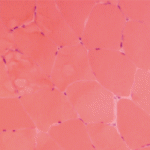Other proposed mechanisms of action of IVIg include modulation of adhesion molecules expressed on various cell surfaces, suppression of cytokine expression, enhancement of regulatory T-cell function, and inhibition of dendritic cell maturation and function.1 High-dose IVIg may also upregulate expression of the inhibitory FcγRIIB, thereby exerting a negative feedback inhibition on antibody production.16 Thus, studies suggest that IVIg affects many steps in the immune response, and the critically important step may differ in various disease states.
Conclusion
Significant progress has been made in understanding the antiinflammatory effects of IVIg in the treatment of autoimmune and chronic inflammatory disorders. But, with the expansion of the number of clinical situations in which high doses of IVIg are effective, the risk of worldwide shortages of this agent also increases. A review of the literature highlights the need for more well-designed, controlled studies. Such studies are imperative to identify the clinical applications where IVIg is truly therapeutic. These studies will also provide more insight into the mechanisms of immune modulation. Further research is also needed to develop a molecularly engineered preparation of a recombinant IVIg to optimize its therapeutic efficacy and reduce the required dosage and thereby potential for shortage.
Disclosure
Dr. Frank is a consultant for CSL Behring. Dr. Wu is a fellow in the divisions of rheumatology and allergy/immunology, and Dr. Frank is the Samuel L. Katz Professor of Pediatrics, division of allergy/immunology, department of pediatrics, Duke University Medical Center, Durham, N.C.
References
- Ballow M. The IgG molecule as a biological immune response modifier: Mechanisms of action of intravenous immune serum globulin in autoimmune and inflammatory disorders. J Allergy Clin Immunol. 2011;127:315-323.
- Berger M. A history of immune globulin therapy from the Harvard crash program to monoclonal antibodies. Curr Allergy Asthma Rep. 2002;2:368-378.
- Ballow M. Safety of IGIV therapy and infusion-related adverse events. Immunol Res. 2007;38:122-132.
- Gelfand EW. Differences between IGIV products: Impact on clinical outcome. Int Immunpharmacol. 2006;6:592-599.
- Imbach P, d’Apuzzo V, Hirt A, et al. High-dose intravenous immunoglobulin for idiopathic thrombocytopenic purpura in childhood. Lancet. 1981;1:1228-1231.
- Nimmerjahn F, Ravetch JV. Antiinflammatory actions of intravenous immunoglobulin. Annu Rev Immunol. 2008;26:513-533.
- Fehr J, Hofmann V, Kappeler U. Transient reversal of thrombocytopenia in idiopathic thrombocytopenic purpura by high-dose intravenous immunoglobulin. N Eng J Med. 1982;306:1254-1258.
- Sultan Y, Masionneuve P, Kazatchkine MD, et al. Anti-idiotypic suppression of autoantibodies to factor VIII (antihaemophilic factor) by high-dose intravenous gammaglobulin. Lancet. 1984;2:765-768.
- Li N, Zhao M, Hilario-Vargas J, et al. Complete FcRn dependence for intravenous Ig therapy in autoimmune skin blistering diseases. J Clin Invest. 2005;115:3440-3450.
- Basta M, Langlois PF, Marques M, et al. High-dose intravenous immunoglobulin modifies complement-mediated in vivo clearance. Blood. 1989;74:326-333.
- Basta M, Fries LF, Frank MM. High doses of intravenous Ig inhibit in vitro uptake of C4 fragments onto sensitized erythrocytes. Blood. 1991;77:376-380.
- Basta M, Dalakas MC. High-dose intravenous immunoglobulin exerts its beneficial effect in patients with dermatomyositis by blocking endomysial deposition of activated complement fragments. J Clin Invest. 1994;94:1729-1735.
- Dalakas MC, Illa I, Dambrosia JM, et al. A controlled trial of high-dose intravenous immune globulin infusions as treatment for dermatomyositis. N Eng J Med. 1993;329:1993-2000.
- Kaneko Y, Nimmerjahn F, Ravetch JV. Antiinflammatory activity of immunoglobulin G resulting from Fc sialylation. Science. 2006;313:670-673.
- Anthony RM, Wermeling F, Karlsson MC, et al. Identification of a receptor required for the antiinflammatory activity of IVIg. Proc Natl Acad Sci USA. 2008;105:19571-19578.
- Samuelsson A, Towers TL, Ravetch JV. Antiinflammatory activity of IVIg mediated through the inhibitory Fc receptor. Science. 2001;291:484-486.


